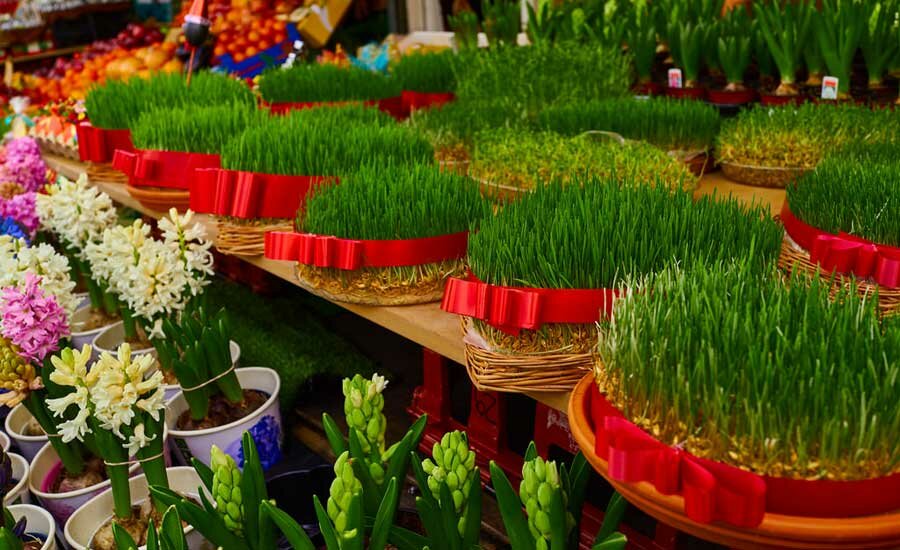Should fruit seedlings replace Sabzeh on Iranian Haft Seen tables?

TEHRAN – While it has been proposed that fruit seedlings should become a substitute for Sabzeh (wheat, barley, mung bean or lentil sprouts in a dish) to avoid consuming huge amount of water for irrigation as well as grains, some experts believe that it does not have any contradiction with environment.
The Iranian New Year celebration (known as Noruz falling on March 21) marks the beginning of spring, which is associated with a great variety of local traditions, such as Haft Seen symbols comprising of seven items beginning with the "S” letter of Persian alphabet, among which Sabzeh is a symbol of livelihood.
Some believe that 1,000 liters of water is consumed on average per 1 kilogram of wheat bean, hence, environmentalists suggest to grow citrus seed instead which leads to a fragrant green bunch resembling Sabzeh in order to avoid wasting water and prevent water shortages.
Hossein Akhani, botanist, environmentalist, and a professor at University of Tehran, said that growing sprouts is an environmentally friendly tradition, many families do not experience plant growth due to urban life; this makes children closely watching the growth process, especially if they do it themselves.
In past recent years, it has been viral to grow citrus seeds instead of wheat and other beans while is not a scientific idea, he lamented, adding, while many propose to plant citrus seeds to avoid water and grain wastage it should be noted that food wastage amounts to much bigger numbers in the country.
Moreover, he added, plants take carbon dioxide out of the atmosphere to do photosynthesis, and thus help reduce the greenhouse gases and emissions.
He went on to say that some people throw their Sabzeh on streets or running water which can cause trouble or make the city looks dirty, otherwise there is no significant problem with planting sprouts.
According to traditions, people throw their Sabzeh in rivers and running water on the thirteenth day of first month on Iranian calendar, Farvardin, known as Sizdah Be-dar, during which people spend time picnicking outdoors.
Furthermore, fruit seedlings do not grow anywhere in the country if they are not native to that area, especially orange and lemon seedlings due to not being compatible with Tehran's climatic characteristic, while grapes can be used instead.
So, we should not forget the local traditions based on unscientific ideas being spread through the social media, he noted, adding that however, we need to be careful in choosing the right plant to grow and avoid planting invasive plant species.
At last, for each Sabzeh a glass of water is required, those who believe that water is wasted through growing sprouts must consider consuming less water while taking a bath or washing the dishes, he said.
Basically, water is the right of the plant that is being lost by humans using water ruthlessly, he regretted.
He went on to highlight that using public transport and reducing the consumption of plastic bags are much more beneficial.
An environmental activists, Ehsan Mirzaei, for his part said that due to the increasing population and the need to import wheat in recent decades, since four years ago, a campaign has been launched aiming at raising people’s awareness of not consuming water for Sabzeh and easily throw them away after 2 weeks.
It means that we informed people of planting a seedling which can stay alive and be beneficial, he added.
The campaign was not intended to replace the Noruz sprouts, but to protect our ancient rituals against climate change and drought, he noted, adding, we also asked the public not to throw their Sabzeh away, but to use it in flower pots or gardens as an organic environmentally friendly plant.
First, we must plant trees or plants compatible with the region’s climate; then, keeping it in a suitable condition which is also very important, he concluded.
FB/MQ/MG
Leave a Comment